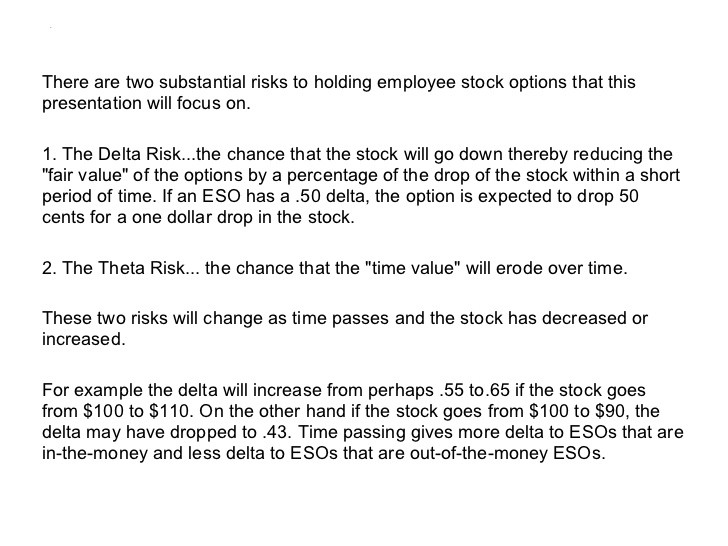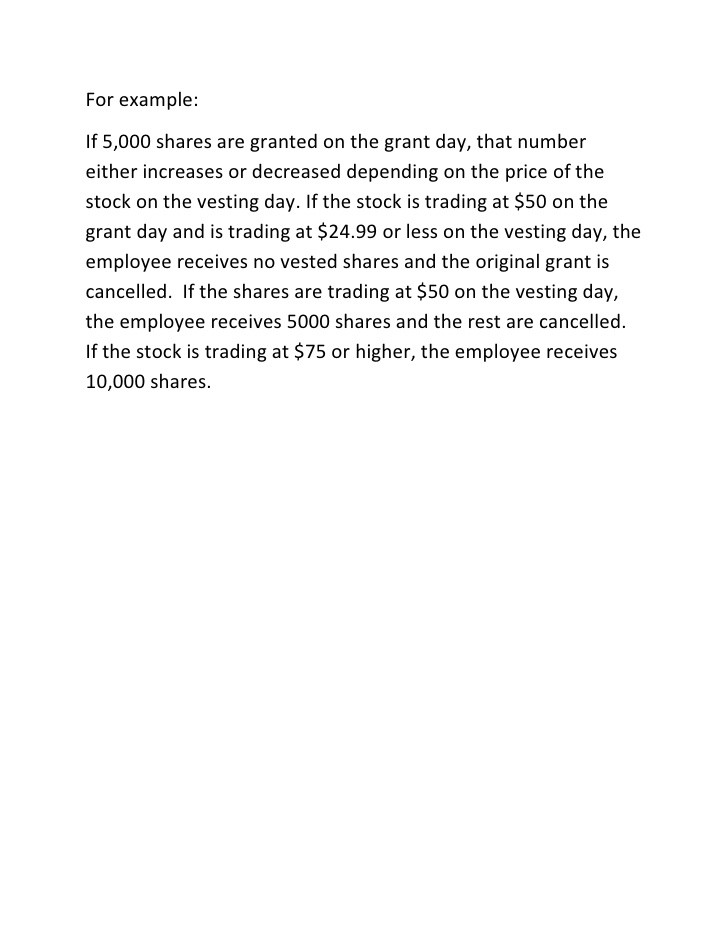Avoid Premature Exercise On Employee Stock Options_2
Post on: 15 Апрель, 2015 No Comment

UPDATE: STOCK OPTIONS AS INCOME FOR PURPOSES OF CHILD SUPPORT
Laura W. Morgan
In recent years, stock options have become an increasingly popular benefit at all tiers of the corporate employment ladder. An employee stock option “allows a corporate employee to buy shares of corporate stock at a fixed price or within a fixed period [and is usually] granted as a form of compensation.” Black’s Law Dictionary 1431 (7th ed. 1999). “It is a contract for a right to buy (call) or sell (put) and, like most contracts, the value of the option depends directly on the terms of the option.” Michael J. Mard & Jorge M. Cestero, Stock Options in Divorce: Assets or Income?. 74 Fla. B. J. 62, 62 (May 2000). Also, a stock option may be vested and matured, vested and unmatured, or unvested. As commentators have explained:
Essentially, the employee stock option is vested and matured if the employee has an absolute right to exercise the option immediately; the option is vested and unmatured if the employee cannot exercise the option yet but has an absolute right to do so at some future date; the option is unvested if it cannot yet be exercised” and if future vesting is based upon the occurrence of a certain contingency.
Kristy Watson, Acting in the Best Interests of the Child: A Solution to the Problem of Characterizing Stock Options as Income. 69 Fordham L. Rev. 1523, 1538 (2001), quoting Note, Stock Options —Classification and Valuation. 15 Equitable Distribution J. 77, 77 (1998). See generally Alexander S. de Witt, “Classification, Valuation, and Division of Stock Options” 6.06 in 2002 Family Law Update (Aspen 2001).
Income From Exercised Stock Options
When a stock option is exercised, the employee has realized income. To the extent that the capital gain is recognized as “income” under the child support guidelines, then the profit realized on the exercise of the stock options will be considered income.
The most recent case to apply this principle is State ex rel Dept. of Health and Human Resources, Child Support Enforcement Div. v. Baker. 2001 WL 1511537 (W. Va. Nov. 28, 2001). In that case, in calculating the income available for the determination of back-owed child support, the family law master included income that resulted through the father’s exercise of certain stock options. In particular, for the years 1998 and 1999, the family law master included as “gross income” to the father earnings that he received from the exercise of stock options he owned in McDonald’s corporate stock for those respective years. The father realized $86,778 in connection with the exercise of stock options for 1998 and $47,620.58 for 1999. The father was required to pay income tax on these funds, and, as evidenced by his tax returns for these respective years, he did pay taxes on the capital gains he realized through the exercise of the stock options.
The court held that the child support guidelines include within its definition of income both earned and unearned income, and there is no basis on which to exclude the recurring income the father received from the exercise of his stock options.
Just one week before, the New Hampshire Supreme Court reached the same result in In re Dolan. 2001 WL 1472651 (N.H. Nov. 21, 2001). There, discussing the public policy reasons for including the exercised stock options as income, the court stated,
Categorizing the exercised stock options as income serves the policy goal of minimizing the economic consequences of divorce to children. If the exercised stock options are not deemed income for child support purposes, a person could avoid child support obligations merely by choosing to be compensated in stock options instead of by a salary. Moreover, children would be deprived of the standard of living equal to that of the subsequent family of the parent paying child support.

These cases are following well established precedent that the income realized from the exercise of stock options constitutes income for purposes of child support. Accord In re Marriage of Kerr. 77 Cal. App. 4 th 87, 91 Cal. Rptr. 2d 374 (1999) (where a parent enjoys substantial income in addition to his salary and bonuses in the form of stock options, this additional income is part of his overall employment compensation and must be used to calculate child support); In re Marriage of Campbell, 905 P.2d 783 (Colo. Ct. App.1995) (exercise of stock options was income); Goold v. Goold. 11 Conn. App. 268, 527 A.2d 696 (1987) (exercise of stock options was income); Kenton v. Kenton ,n 571 A.2d 778 (Del. 1990) (post-divorce profits realized from the exercise of stock options are income for child support); Stacey v. Stacey. 1999 WL 1097975 (Tenn. Ct. App. Oct. 6, 1999); Smith v. Smith. 1997 WL 672646 (Tenn. Ct. App. Oct. 29, 1997); In re Interest of C.J.. 2001 WL 493701 (Tex. App. — Dallas, May 10, 2001) (unpublished) (income from his stock options should have been considered in computing net monthly income); Forsythe v. Forsythe. 1996 WL 1065613 (Va. Cir. Ct. 1996). Cf. Yost v. Unanue. 109 Ohio App. 3d 294, 671 N.E.2d 1372 (1996) (exercise of stock options would not be considered income because it was a one-time event); Frazier v. Frazier. 2001 WL 1222248 (Tenn. Ct. App. Oct. 15, 2001) (parties, by valid separation agreement, excluded from income calculation, income from stock options).
Possible Income From Unexercised Stock Options
In a case of first impression, the Ohio Court of Appeals in Murray v. Murray. 128 Ohio App. 3d 662, 716 N.E.2d 288 (1999), addressed whether unexercised stock options should be included in “gross income” for purposes of determining child support, and if so, how to value the stock options.
Relying on the general principle that the definition of income is intended to be both broad and flexible, the court held that unexercised stock options are to be considered part of gross income. The court specifically analogized the unexercised stock options to retained earnings of a corporation where the parent is the majority shareholder. Williams v. Williams. 74 Ohio App. 3d 838 (1991). In both these instances, the parent should not be allowed to sit upon assets and hide behind the shield of a corporate business decision, depriving the children of an income stream they would otherwise enjoy. As to the value of the unexercised stock options, the court held that the best way to value stock options is to account for the options’ appreciation in value as determined on the grant and exercise dates of the options which fall into the income year at issue. By this method, the options are valued according to the underlying stock price on the date most important to the options’ holder, the date the options may be exercised and income realized.
The Murray case draws upon the long line of authority holding that retained earnings will be considered “income” to the owner/parent if the parent has the ability or discretion to draw on the funds.
Since the Murray decision, other courts have followed and held that vested, but unexercised, stock options are income for purposes of child support. See Jack E. Karns & Jerry G. Hunt, Should Unexercised Stock Options Be Considered “Gross Income” Under State Law for Purposes of Calculating Monthly Child Support Payments?. 33 Creighton L. Rev. 235, 256 (2000). In In re Marriage of Robinson and Thiel. 2001 WL 146455607 (Ariz. App. Div. 1 Nov. 20, 2001), the court held that vested but unexercised employee stock options constitute income for purposes of calculating child support under the 1996 Arizona Child Support Guidelines, because the options were an integral part of his compensation package. “Although his base salary was $42, 600, David’s total income from AOL, including income from exercised options, was $159,721 in 1995, $88,297 in 1996, $267,438 in 1997, and $1,817,059 in 1998. That the options comprise a significant part of David’s compensation and represent value to him is irrefutable.” The court declined, however, to adopt a universal method of valuing such options and left that to the trial court’s discretion, based on the facts and circumstances of each case. See also In re Marriage of Cheriton. 92 Cal. App. 4 th 2690, 111 Cal. Rptr. 2d 755 (2001) (court would consider unexercised stock options not as “income” but as part of parent’s overall wealth and assets in setting support); Seither v. Seither. 779 So.2d 331 (Fla. 2d DCA 1999); In re Marriage of Moore. 2000 WL 564165 (Iowa App. 2000); Clark v. Clark. 779 A.2d 42 (Vt. 2001) (emerging trend is to treat vested stock options as income).














